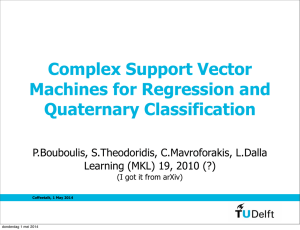Further differentiation and integration
advertisement
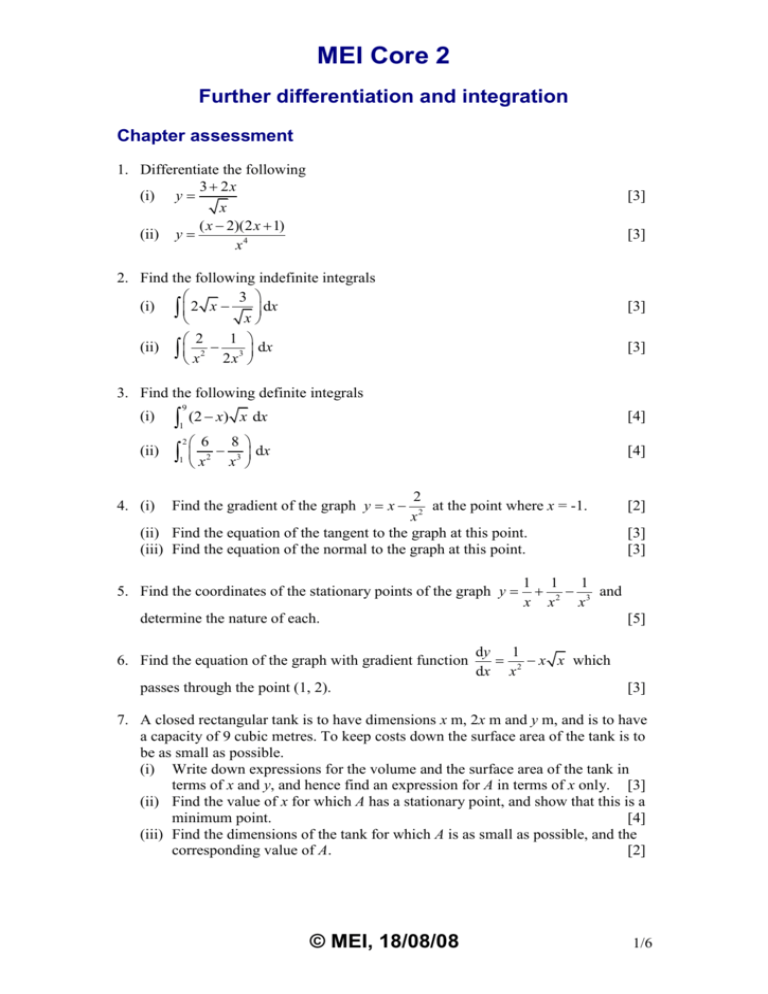
MEI Core 2 Further differentiation and integration Chapter assessment 1. Differentiate the following 3 2x (i) y x ( x 2)(2 x 1) (ii) y x4 [3] [3] 2. Find the following indefinite integrals 3 (i) 2 x dx x 1 2 (ii) 2 3 dx x 2x [3] [3] 3. Find the following definite integrals (i) 9 (ii) 2 1 1 (2 x) x dx [4] 6 8 2 3 dx x x [4] 2 at the point where x = -1. x2 (ii) Find the equation of the tangent to the graph at this point. (iii) Find the equation of the normal to the graph at this point. 4. (i) Find the gradient of the graph y x 5. Find the coordinates of the stationary points of the graph y passes through the point (1, 2). [3] [3] 1 1 1 and x x 2 x3 determine the nature of each. 6. Find the equation of the graph with gradient function [2] [5] dy 1 x x which dx x 2 [3] 7. A closed rectangular tank is to have dimensions x m, 2x m and y m, and is to have a capacity of 9 cubic metres. To keep costs down the surface area of the tank is to be as small as possible. (i) Write down expressions for the volume and the surface area of the tank in terms of x and y, and hence find an expression for A in terms of x only. [3] (ii) Find the value of x for which A has a stationary point, and show that this is a minimum point. [4] (iii) Find the dimensions of the tank for which A is as small as possible, and the corresponding value of A. [2] © MEI, 18/08/08 1/6 MEI C2 Further calculus assessment solutions 8. The diagram shows part of the graph of y 5 x 2 4 . x2 y x Find the area enclosed between the graph and the x-axis. [5] Total 50 marks © MEI, 18/08/08 2/6 MEI C2 Further calculus assessment solutions Chapter assessment Solutions 3 2x 1. (i) y dy dx dx 2. (i) 1 x 1 23 x 2 x 2 3 1 ( x 2)(2 x 1) (ii) y dy 3x 2 2 x 2 x4 2 x 2 3 x 3 2 x 4 4 x 3 9 x 4 8 x 5 2 x 3 dx x 2x 4 3 1 2 3 x 2 dx 1 3 2 1 2 x 6x c 1 2 dx 2 x 2 21 x 3 dx (ii) 2 3 2x x 2 x 1 41 x 2 c 3. (i) (2 x )( 9 1 x ) dx 9 1 2 x 1 2 3 x 2 dx 9 43 x 2 52 x 2 1 3 4 3 5 3 5 9 2 52 9 2 4 3 3 5 1 2 23 1 3 43 27 52 243 43 52 4 36 486 5 3 2 5 62 152 2 6 8 (ii) 2 3 dx 1 x x 6 x 2 1 2 8 x 3 d x 2 6 x 1 4 x 2 1 6(2)1 4(2)2 6(1)1 4(1)2 ( 3 1) ( 6 4) 2 2 0 © MEI, 18/08/08 3/6 MEI C2 Further calculus assessment solutions yx 4. (i) dy dx 2 x 2 x 2 x 2 1 4 x 3 When x 1, dy dx 1 4( 1)3 1 4 3 (ii) When x 1, y 1 2 1 2 3 ( 1)2 y y 1 m( x x 1 ) y ( 3) 3( x ( 1)) y 3 3 x 3 y 3 x 6 (iii) The tangent has a gradient of -3, 1 1 so the normal has a gradient of 3 3 y ( 3) 31 ( x ( 1)) 3( y 3) x 1 3y 9 x 1 3y x 8 1 5. y dy dx x 1 x 2 1 x3 x 1 x 2 x 3 x 2 2 x 3 3 x 4 Stationary points occur where dy dx 0 0 x 2 2 x 3 3 x 4 3 x 4 x 2 2 x 3 3 x2 2x x2 2x 3 0 ( x 3)( x 1) 0 x 1 or x 3 When x = 1, y 1 1 1 1 5 When x = -3, y 31 19 271 27 d2 y dx 2 2 x 3 6 x 4 12 x 5 © MEI, 18/08/08 4/6 MEI C2 Further calculus assessment solutions When x 3 : d2 y 2 dx d2 y 2( 3) 3 6( 3)4 12( 3) 5 2 2 27 27 814 814 dx 2 5 As this is positive, 3, 27 is a local minimum. When x 1 : d2 y dx 2 d2 y 2(1)3 6(1)4 12(1)5 2 6 12 4 dx 2 As this is negative, (1,1) is a local maximum. 6. dy dx dy dx 1 x 2 x x x 2 x( x 2 ) 1 x 2 x 2 3 y x 2 x 3 2 dx y x 1 52 x c 5 2 When x = 1, y = 2: 2 (1)1 52 (1)2 c 5 2 1 52 c c 17 5 y x 1 52 x 175 5 2 7. (i) Volume x(2 x )( y ) 2 x 2 y Surface Area 2( x )(2 x ) 2( x )( y ) 2(2 x )( y ) 4 x 2 2 xy 4 xy 4 x 2 6 xy Volume 9 2 x 2 y y 9 2x2 9 2 2x A 4 x 2 6 x 54 x 2x2 A 4 x 2 27 x 1 A 4x 2 © MEI, 18/08/08 5/6 MEI C2 Further calculus assessment solutions (ii) dA 8 x 27 x 2 dx Stationary point occurs when dA 0 dx 8 x 27 x 2 8 x 3 27 x3 x 27 8 3 2 d2 A 8 54 x 3 dx 2 d2 A When x 1.5 , 2 8 16 24 dx As this is positive, the stationary point at x 1.5 is a local minimum. (iii) At the minimum point, x 1.5 m Dimensions 1.5 m, 2(1.5 ) m, 1.5 m, 3 m, 2 m A 4 x 27 x 1 9 m 2(1.5 )2 2 A 4(1.5 2 ) 27(1.5 )1 A 9 18 27 m 2 8. y 5 x 2 4 x2 y 5 x 2 4 x 2 When y 0 : 0 5 x 2 4 x 2 5 x2 x4 4 0 x4 5 x2 4 0 x 2 4 x 2 1 0 x2 4 x 2 or x 2 1 x= 1 The area we want is for positive x values, so the boundaries are x = 2 and x = 1. Area 2 1 5 x 2 4 x 2 dx 2 5 x 31 x 3 4 x 1 1 5(2) 31 (2)3 4(2)1 5(1) 31 (1)3 4(1)1 10 83 2 5 31 4 28 3 2 3 26 3 © MEI, 18/08/08 6/6


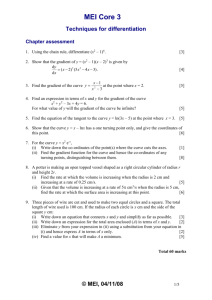
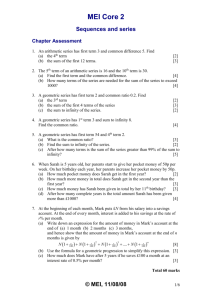
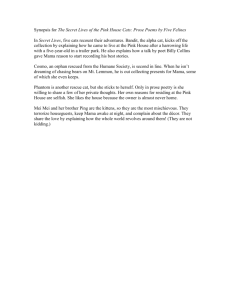

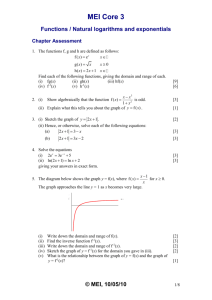


![Kwadijk-Deltatechnology presentation [Compatibiliteitsmodus]](http://s2.studylib.net/store/data/005765666_1-8750ea686d0c834b2bb5a5055d5c4a69-300x300.png)
